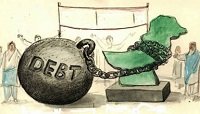Over the past few months, Pakistan’s dire economic situation has garnered considerable attention in the political, media and intellectual mainstream.
Back-breaking inflation, record unemployment and a plunging rupee have been accompanied by desperation to acquire more loans from external creditors, most notably the International Monetary Fund (IMF). Even now the country stands perilously close to default.
The current government insists that the current crisis is the fault of the PTI regime that preceded it. The PTI, for its part, is also doing little more than playing blame games – in fact, all mainstream parties and the military establishment appear more interested in taking and holding on to power rather than resolving the deep structural issues that afflict Pakistan’s economy, and, therefore, its youthful masses. The pitched battles to arrest Imran Khan are just the latest example of the game of thrones that dominates Pakistani politics.
Indeed, economic woes are borne by workers, peasants, women, and ethnic and religious minorities – not by ruling-class landlords, real estate moguls, generals, judges, big industrialists and traders. The reason why we find ourselves in this state is not one or the other big party, but a decades-old political-economic structure that has privileged the interests of imperialist powers militarised state apparatus and propertied elites in the country over the welfare of the masses.
The Awami Workers Party believes that a genuine departure from Pakistan’s prevailing political economy is only possible by adopting a genuine left-wing programme of redistribution and regional peace alongside a shift away from speculative profiteering and ecologically disastrous natural resource grabs towards labour-intensive production so as to provide gainful employment to meet the needs of the 150 million young working people in our country.
Join us on Sunday, 17 March for a special panel discussion at the National Press Club, Islamabad in which will articulate how to break the stranglehold of Pakistan’s classed, gendered, racialised and imperialised political economy.

The High Asia Herald is a member of High Asia Media Group — a window to High Asia and Central Asia

